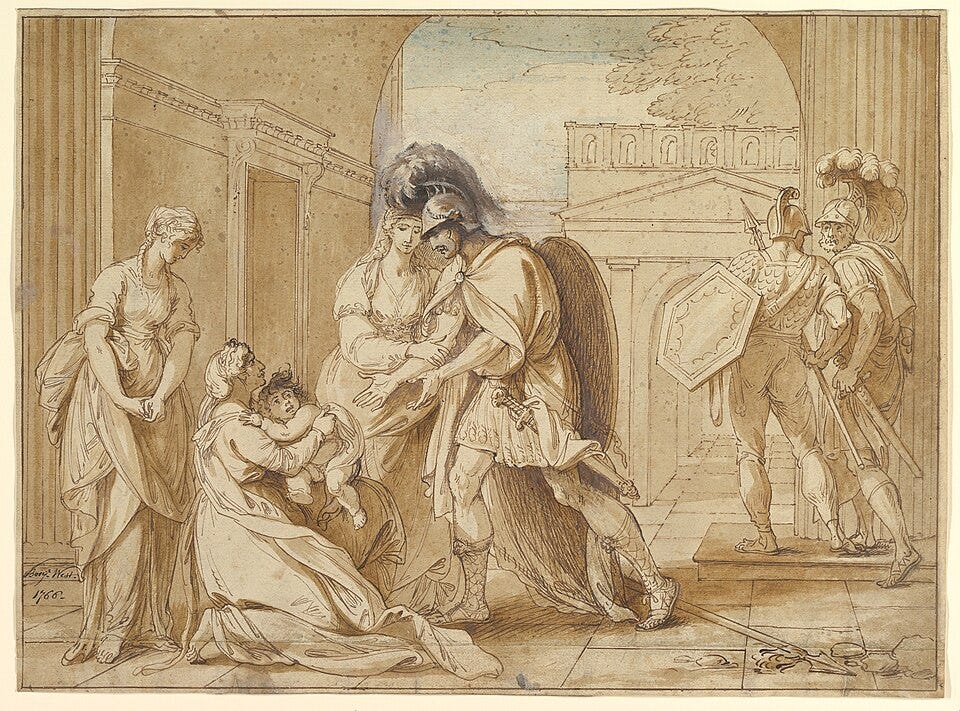
Hello, friends!
We’re bouncing between centuries this week: from the rage of Achilles to the rise of superhuman AI. And somehow, it all connects.
Between work and parenting, I’ve also been neck-deep in The Iliad, translated by the ever-brilliant Emily Wilson. Equal parts soap opera and bloodbath. Achilles gets the press, but it’s Hector who carries the soul. More on that below (plus some delightfully petty ancient insults)
Anyways, on with the links.
The Links:
Look: Winners of World Press Photo Contest, 2025
A sobering snapshot of the modern college student: distracted, underprepared, and overwhelmed. The average college student at a regional public university cannot understand complex adult literature, often writes at an eighth-grade level, frequently skips classes, and struggles to disconnect from their phones, even for a 50-minute lecture. Scriptorium Philosophia.
The smart folks over at AI Futures Project predict that the next ten years will change everything. Bigger than the Industrial Revolution. I don’t know about you, but I’m paying close attention.
"We predict that the impact of superhuman AI over the next decade will be enormous, exceeding that of the Industrial Revolution. We wrote a scenario that represents our best guess about what that might look like. It’s informed by trend extrapolations, wargames, expert feedback, experience at OpenAI, and previous forecasting successes."
Let your kids do things! A note to all the helicopter parents (myself included): maybe the bravest thing we can do is step back. Let them order their own ice cream. Miss the bus. Find their way back. Independence might just be the most underrated kind of joy. Collab Fund
Read: April is National Poetry Month, so please enjoy this gorgeous poem "Love After Love" by Derek Walcott. A reminder to love ourselves.
What I’ve Been Reading:
The Iliad, by Homer (translated by Emily Wilson)
Goddess, sing of the cataclysmic wrath/of great Achilles, son of Peleus,/which caused the Greeks immeasurable pain/and sent so many noble souls of heroes/to Hades, and made men the spoils of dogs,/a banquet for the birds.
Homer's Iliad is a wild ride! Infuriating. Hot-headed heroes bickering like toddlers over a “prize”1. Silly. Grown men throwing spears and yelling dramatic insults2. Everyone yelling at Paris3. The whole plot is essentially because of an extended temper tantrum.
But then it hits you with the sadness of war, the brutal losses, the families torn apart. And mixed in with all this drama is a bunch of meddling, beautiful, petty, vengeful, heroic, messy gods and goddesses (Zeus! Hera! Athena! Apollo! Aphrodite! Hermes! Poseidon! etc)4. You'll need to keep track of who's sleeping with whom, which god is helping which side, and why everyone is so angry all the time.
It's undeniably complicated, and has more bloodshed than a Quentin Tarantino movie. But this story has influenced everything, from how we think about heroes to pretty much every war movie ever made. Even the verb “hector5” comes from The Iliad (and the personal name too)!
To me, the heart of the story is really Hector, not Achilles. Hector is a husband, a father, a prince, and a protector, and his story makes real what it takes to be a good man in a unjust world.
In a world full of would-be Achilles, it’s harder to be a Hector.
Now, I’m off to watch Brad Pitt, Eric Bana, and Orlando Bloom in Troy 😊.
In Quotes...
The first rule is to keep an untroubled spirit. The second is to look things in the face and know them for what they are.”
— Marcus Aurelius
That "prize" was a woman named Briseis. A war prize, to be precise. Because in those ancient times, women were largely treated as property. And because apparently, starting a decade-long war over a stolen wife wasn't dramatic enough.
Diomedes to Paris (who started the whole war by abducting Helen), after being wounded by his arrow:
You good-for-nothing archer! Sleazy flirt! So rude! So cocky in your silly hairstyle! If you tried fighting with me face to face, your bow and your swift arrows would be useless. You brag like this because you grazed my foot. I barely noticed it—as if a woman or foolish child had slapped me. Blows that come from nobodies and cowards do not hurt. Even a scratch from me cuts sharp and deep, and instantly, my enemy is dead.
Hector to his brother Paris (can you tell everyone —justifiably— rags on Paris?)
Pathetic Paris! Womanizer! Cheat! You are the very best at looking pretty. Oh, how I wish that you had never lived or died unmarried. That would be far better than life as such an object of contempt.
Hephaestus is hands-down my favorite god in The Iliad: he minds his business, hammers stuff, and does whatever his mom, the goddess Hera, tells him. Zero interest in family drama. A true king of low-stakes vibes in a high-stakes myth. Also, maybe the world’s first creator of artificially intelligent robots?
"to bluster, bully, domineer," 1650s, from slang hector (n.) "a blustering, turbulent, pervicacious, noisy fellow" [Johnson], 1650s, from Hector of the "Iliad," in reference to his encouragement of his fellow Trojans to keep up the fight. Earlier in English the name was used generically for "a valiant warrior" (late 14c.). Source.




